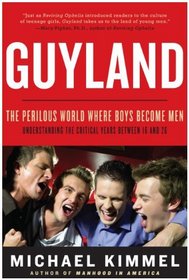Helpful Score: 1
Guyland is an interesting and thought-provoking book. Sociologist Michael Kimmel charts Guyland as both a now-extended life stage between adolescence and adulthood and a social arena with its own set of rules and cultural imperatives. Young men, roughly between ages 16 and 26, are now spending more years living in a buddy culture with its "boys will be boys" behaviors (playing video games and sports, boozing, and hooking up)—and emerging less equipped for adult living. An unwritten Guy Code promotes a culture of entitlement, silence, and protection which allows more egregious behavior such as extreme hazing and sexual predation to go unchecked.
While I don't doubt that such a culture exists—sounds a lot like the fraternity scene—I'm not sure it's as pervasive as Kimmel makes it out to be. Most of his subjects are white, middle-class, college-educated. Being of the wrong demographic in multiple ways, I've only personally peripherally brushed upon it. Moreover, since he qualifies many of his findings by saying that most young men aren't fully immersed or resent it, and most will outgrow it, is it such a big problem? However, I found the gender attitudes he uncovered very interesting. Guyland can be seen as an escapist backlash against the erosion of WASPy privilege, whereas most women would feel that men still hold most of the aces. It was also shocking to see that some attitudes, if given the right political and cultural background, can lead to women being forced to veil.
In summary, Guyland was a book I enjoyed because of the thoughts it inspired, although I'm not sure how spot on is the message, or whether Kimmel's proposed solutions would work.
While I don't doubt that such a culture exists—sounds a lot like the fraternity scene—I'm not sure it's as pervasive as Kimmel makes it out to be. Most of his subjects are white, middle-class, college-educated. Being of the wrong demographic in multiple ways, I've only personally peripherally brushed upon it. Moreover, since he qualifies many of his findings by saying that most young men aren't fully immersed or resent it, and most will outgrow it, is it such a big problem? However, I found the gender attitudes he uncovered very interesting. Guyland can be seen as an escapist backlash against the erosion of WASPy privilege, whereas most women would feel that men still hold most of the aces. It was also shocking to see that some attitudes, if given the right political and cultural background, can lead to women being forced to veil.
In summary, Guyland was a book I enjoyed because of the thoughts it inspired, although I'm not sure how spot on is the message, or whether Kimmel's proposed solutions would work.




